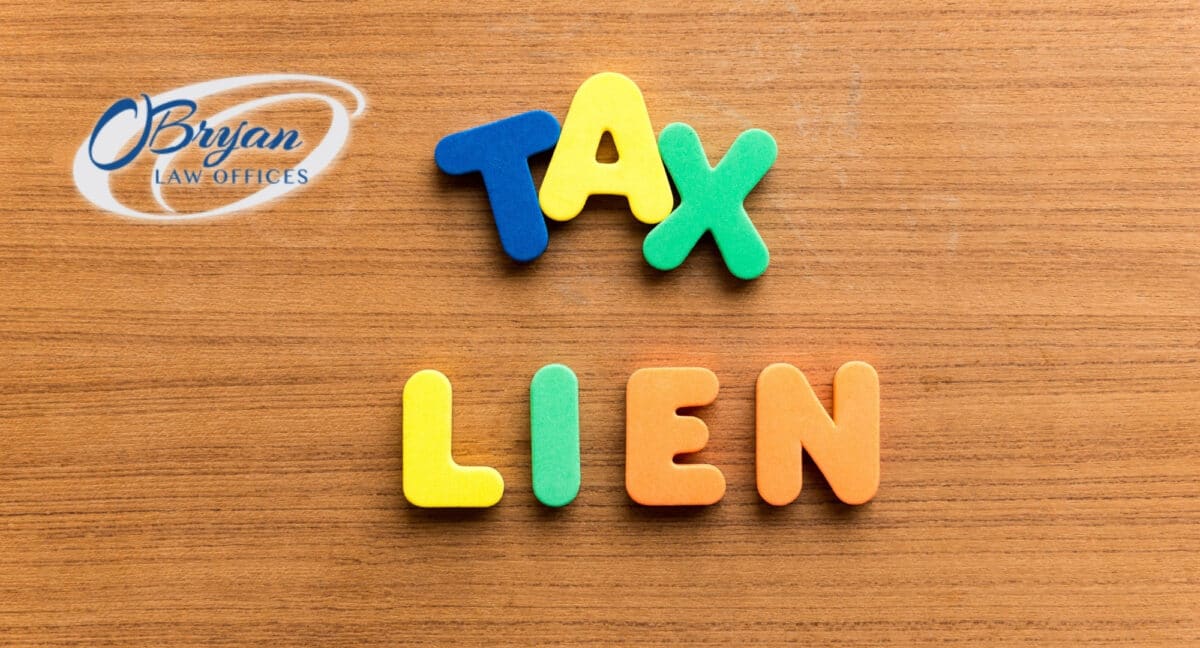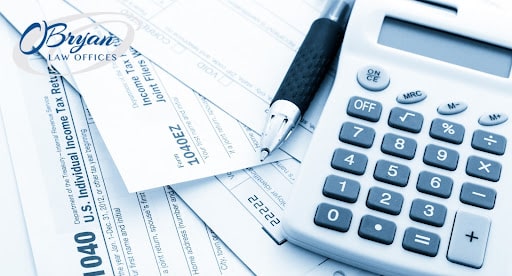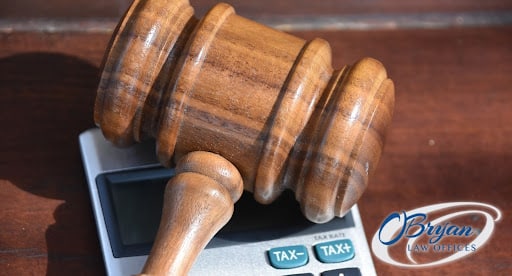Tax Lien Removal

Tax Lien Removal for Individuals or Businesses

According to the IRS, a tax lien is “the government’s legal claim against your property when you neglect or fail to pay a tax debt.” At O’Bryan Law Offices, we’re here to guide you through the best legal options to remove a tax lien. Our experienced tax attorneys will prepare the best plan for your situation to get your life back on track. Whether you need a Kentucky lien release, lien withdrawal, IRS or federal tax lien removal, or another solution, we can help you get there. Call today at 502-339-0222 to set up your consultation or fill out our online intake form. Below, we list the types of tax liens that our tax lawyers handle. We handle both federal tax liens (IRS tax liens) and state tax liens.
What Is a State Tax Lien?
A tax lien is basically a way for state and federal governments to collect on your IRS tax debt. Both the Internal Revenue Service and state revenue agencies can issue tax liens.
The federal tax lien allows the government to claim your assets, including the following:
- Real or personal property
- Financial assets
- Any bank account you might have
- Business property
- Real estate
- Equipment that you own for personal or business use
- Intellectual property
The tax lien aims to protect the government’s interest in this property. However, it’s important to remember that a tax lien is not the same as a tax levy. Liens signify that the IRS or the state has the ability to make a claim against your property. Levies are entirely separate actions in which the government actually seizes your property when you owe money, property taxes, or tax debt to them.
Why Is It Important to Remove a Tax Lien?
It’s important to deal with both a state and federal tax tax lien sooner rather than later. This is because having a tax lien on your personal property can have serious impacts on your finances. Below, we list several reasons why it’s important to have tax professionals help remove your lien.
Even though liens are no longer visible on credit reports, they are still filed publicly. Creditors and credit agencies have the ability to access these public records. If they spot a tax lien in your file, they may hesitate to trust your creditworthiness.
Lenders can also see these public lien records. Therefore, liens can affect your ability to get a loan.
Lastly, you can’t sell any property that has a lien on it. This means you can’t make money from the sale of that property.
Basically, if you have current or future plans of opening a new account, borrowing money, or selling assets, it gets much harder to do this with a tax lien. You’ll want to make sure that you contact our tax professionals as soon as possible to avoid a tax lien or tax levy on your property.
What Is the Difference Between a Tax Lien Withdrawal and a Tax Lien Release?
When the IRS files a Notice of Intent to File a Federal Tax Lien, they have a chance to withdraw the lien before it attaches to your assets Federal lien withdrawal. If they decide to withdraw the lien, this usually means that the taxpayer has already taken the initiative to repay their tax debt. Once the consumer pays their tax bill in full, the IRS has only 30 days to withdraw their intent to file a federal tax lien.
The IRS issues a release when the taxpayer finally repays their taxes owed to the government. However, a release occurs after the state or federal lien has already been placed on the assets. Basically, a lien withdrawal occurs before the lien is placed. A release occurs after the lien is placed.
State Tax Lien Removal

The state of Kentucky may place a lien or claim on your property if you fail to pay your tax debts. Examples of claims include those on your home, any real estate, boats, accounts receivable, and more. The state files a tax lien notice within the county where your business or residence is located.
The Kentucky State Department of Revenue must meet these requirements before it files a Notice of State Tax Lien:
- The state must prepare a Notice of Tax Due for these reasons:
- The taxpayer filed but did not pay the correct amount.
- The taxpayer did not file a return.
- The state must mail the Notice of Tax Due to the taxpayer and demand payment.
- The taxpayer neglects or refuses to pay the full amount.
In order to avoid receiving a Notice of State Tax Lien, you should either pay the tax liability in full or contact the Department of Revenue to discuss a payment plan. Even under a payment plan, the state can still file a lien against you.
How To Remove a State Tax Lien From Public Record
Tax liens can harm your credit rating. Under federal law, consumer reporting agencies maintain the right to retain and report your Notice of State Tax Lien for up to seven years after you paid your liability. For these reasons, you may want to take these steps to remove the lien from your credit reports:
- Request a copy of your credit report. Check the lien status. Credit bureaus automatically update this status without a request.
- Contact all involved agencies to dispute the lien if your status is not up to date.
- Those agencies will contact your county’s courthouse to confirm your information. Each dispute will be resolved. The agencies will contact you to confirm how each dispute turned out, and they will let you know if the lien was removed.
How to Get a State Tax Lien Removed from Credit Report?
If a lien was filed against you, you might worry about how the lien will affect your credit report. Luckily, there are a few steps you can take to have a state tax lien removed from your credit report. We outline these steps below.
- Obtain a copy of your credit report. Then, check your report under the “public records” section to see the lien.
- Pay off your balance. You can either do this by paying in full or by negotiating an installment agreement. This agreement could outline monthly payments, consecutive direct debit payments, or another method of payment.
- Save all the documents related to the lien and the installment agreement. Once you finish paying your tax debt, request a letter from your state agency to show that you paid it in full. Send this to all major credit bureaus.
- Ask the credit bureaus to remove the lien from your reports. Keep in mind that each bureau has its own removal process, so you’ll need to contact them individually.
- Once you file your dispute, keep copies of these records. The credit bureaus that you contact must respond to you within 30 days and make a decision within 90 days.
How To Remove a Tax Lien
Our experienced Kentucky bankruptcy attorneys have all the information you need to remove your tax lien. In this section, we’ll explain how to appeal your lien, have it withdrawn, have it released, and subordinate your lien.
Appeal Your Tax Lien
If we can prove that the IRS was in the wrong, you can lift your federal tax lien through the appeals process. Below are examples of when this is appropriate:
- You paid your tax debt in full.
- The lien was falsely filed against you.
- The IRS did not follow the proper procedures.
- The statute of limitations on tax debt collection expired.
- You did not get an opportunity to challenge the amount.
- You were filing for bankruptcy when the IRS filed a federal tax lien.
- The liability is your spouse’s, and you want to use this defense.
If any of these apply to you, file for an appeals hearing right away. You must file the request within 30 days of the lien filing. If you feel overwhelmed, our office is here to help. We will provide all the information you need to appeal your lien.
Have Your Lien Withdrawn
This is a hopeful option for many of our clients. When you have a lien withdrawn, it’s as if the lien was never there. If you pay your lien off, or if we prove it to be falsely filed, this option may work for you.
In some cases, the IRS may agree to allow the taxpayer to pay less than the total tax debt but still an adequate amount. As this is not full repayment, this is a “release” rather than a withdrawal.
Have Your Lien Released
You may also file for a lien release or have your lien released automatically. Automatic releases occur 30 days after you pay your tax debt in full or if you arrange a payment plan. After a lien is released, it is not tied to your assets any longer. Public records reflect this change, but you should still send a copy of the release to credit reporting bureaus to reflect the change on your credit report.
Subordinate Your Lien
The last option we’ll outline is lien subordination. In this situation, another creditor subordinates the IRS’s interest in a certain property, allowing them to move ahead of the line. For example, during a home refinancing, the home may have a lien placed on it. The IRS may allow a lender to overlook the lien to move ahead with refinancing. In this case, the IRS may want a portion of the profits.
This process is often convoluted and not usually the most favorable. As this option often stands to benefit the IRS more than the taxpayer, we recommend speaking with our tax attorneys to fully explore your options.
How To Avoid a Tax Lien
The simplest, most effective way to avoid a state or federal tax lien is to pay your taxes on time and in full. Always file your taxes before the IRS considers filing a lien against you. While these liens are removable, they might badly damage your credit score.
We’ve compiled a list of ways to stay on top of your taxes and avoid a lien:
- Always respond in a timely manner to letters from the IRS.
- Keep track of your tax status. Organize your records in a secure location.
- If you believe your federal tax lien was falsely filed, contact the IRS sooner rather than later.
- If you cannot pay in full before the deadline, file an extension and pay as much as you can.
- If you cannot pay in full before the deadline, contact the IRS to set up an installment plan.
- Always make your installment payments on time and in full.
- Contact O’Bryan Law Offices to speak with our experienced tax attorneys. They will help you through the process and make sure you get the best possible outcome.
Kentucky Lien Release

To obtain a tax lien release in Kentucky, you’ll first need to contact your lien holder. Request a copy of the lien. Then, you will either begin the repayment process or provide proof of payment. If this doesn’t lead to your tax lien release, you’ll need to continue on to the next step. Request a Release of Lien form from the Federal Deposit Insurance Corporation’s Division of Resolutions and Receiverships. Specifically, Kentucky residents must make this request to the DRR Customer Service Center in Illinois. When you submit your request, submit your proof of payment, as well as your contact information.
Kentucky Lien Release Form
You’ll need to download and print a Form 12A503, Application for Specific Lien Release. Download this form from the website of the Kentucky Department of Revenue. Fully complete the form, then mail the form and attachments to the Department of Revenue’s Division of Collections in Frankfort, KY.
Experienced Lien Removal Attorney
If a state or federal tax lien was filed against you, we recommend speaking with a Kentucky tax attorney as soon as possible. At O’Bryan Law Offices, our consumer bankruptcy attorneys have extensive experience handling state tax liens. To schedule your free consultation with us, please call our law office at 502-339-0222 today.
